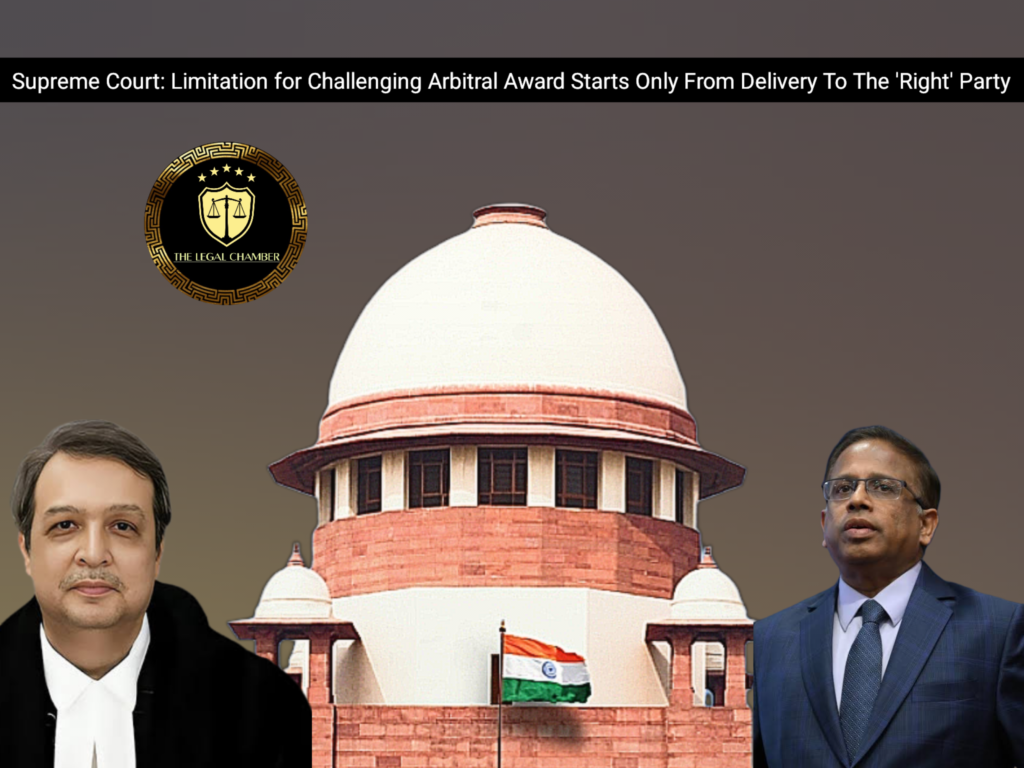
This Supreme Court judgement clarifies that the limitation period for filing an application to set aside an arbitral award under Section 34 of the Arbitration and Conciliation Act, 1996 begins only from the date a signed copy is validly delivered to the “party” as defined under the Act. For government entities, this “party” refers to the head of the concerned department or a person with decision-making authority, not a mere authorised representative. Service on a junior official does not constitute valid delivery to start the limitation clock.
Facts Of The Case:
The dispute originated from a contract executed between the appellant, M/s. Motilal Agarwala, and the State of West Bengal. An arbitral award was passed in favour of the appellant on 12th November 2013. On that same day, an authorised representative of the State, an Assistant Engineer, collected a signed copy of the award. However, the State claimed it remained unaware of the award’s existence. The statutory 90-day limitation period for challenging the award under Section 34 of the Arbitration Act expired on 12th February 2014. The State filed its application to set aside the award only on 20th March 2014, after learning of it through execution proceedings initiated by the award-holder. The primary contention was whether the application was time-barred. The District Court dismissed the State’s application as being filed beyond the limitation period. On appeal, the Calcutta High Court set aside this order, ruling that the delivery of the award to the Assistant Engineer did not constitute valid service upon the “party” (the State), and thus the limitation period had not commenced. The award-holder then appealed to the Supreme Court against this decision of the High Court.
Procedural History:
The arbitral award was first challenged by the State under Section 34 of the Arbitration Act before the District Court. The District Court dismissed the application, holding it to be time-barred as the limitation period commenced from when the State’s authorised representative received the award. Aggrieved by this, the State filed an appeal (F.M.A. No. 4576/2015) before the High Court at Calcutta. The High Court allowed the appeal, setting aside the District Court’s order and ruling that the Section 34 application was not barred by limitation, as proper service was not effected on the competent “party”. The award-holder, M/s. Motilal Agarwala, then appealed to the Supreme Court of India, which culminated in the present civil appeal.
READ ALSO:Supreme Court: Prosecution Without Confirmed Penalty is Abuse of Process
Court Observation:
The Supreme Court observed that the delivery of an arbitral award under Section 31(5) is a matter of substance, not mere formality, as it triggers the limitation period for various applications, including a challenge under Section 34. Critically, the Court affirmed that the term “party” as defined in the Act refers strictly to a party to the arbitration agreement and does not include their agents or unauthorized representatives. Relying on its precedent in Union of India vs. Tecco Trichy, the Court held that for a large government entity, a valid delivery occurs only when the award is received by the head of the concerned department or a person with direct knowledge of the case and the decision-making authority to challenge the award. Consequently, delivering the signed award to a junior official like an Assistant Engineer, who lacked such authority, did not constitute valid service and thus, the limitation period for filing the Section 34 application did not commence from that date.
Final Decision & Judgement:
The Supreme Court dismissed the appeal filed by M/s. Motilal Agarwala and upheld the impugned judgment of the Calcutta High Court. The Court affirmed that the application under Section 34 of the Arbitration and Conciliation Act, 1996, filed by the State of West Bengal, was not barred by limitation. It was conclusively held that the delivery of the signed arbitral award to the State’s authorized representative, an Assistant Engineer, did not constitute a valid delivery to the “party” as defined under the Act. Consequently, the period of limitation for challenging the award had not legally commenced from that date. The Supreme Court directed the District Court to expedite the matter and decide the State’s Section 34 application on its own merits within six months.